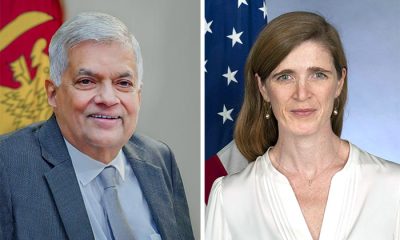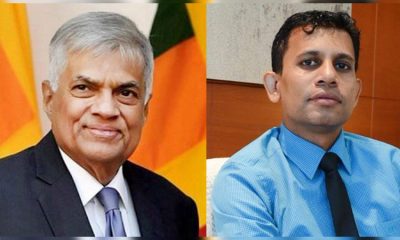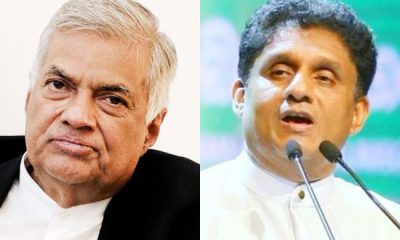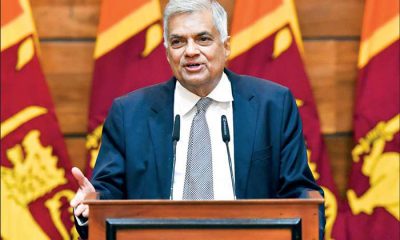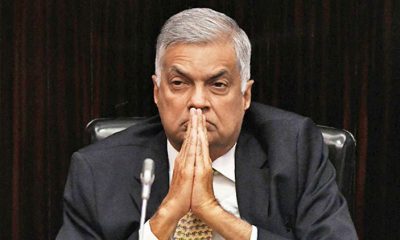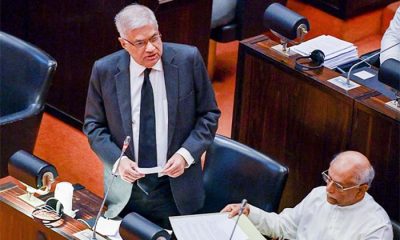Features
Full implementation of 13A– Final solution to ‘national problem’ or end of unitary state? – Part VII
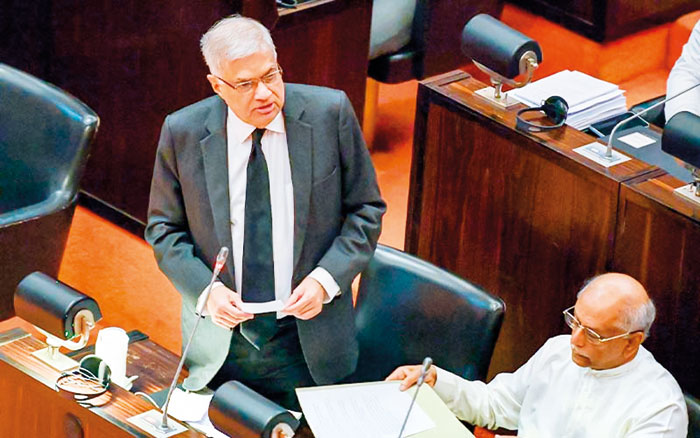
by Kalyananda Tiranagama
Executive Director
Lawyers for Human Rights and Development
(Continued from yesterday (03 Oct.)
President Wickremesinghe’s solution
From the statements made by President Ranil Wickremesinghe before Parliament and at public fora at different times it appears that he believes that the most urgent task before him is providing a solution to the ethnic Issue acceptable to the Tamil political parties in the North-East. Soon after assuming duties as the Prime Minister in Gotabaya Rajapaksa government in May 2022, he declared in Parliament that he would take steps to address the grievances of the People in the North and the East for meaningful devolution of power through Constitutional amendments with the consensus of other political parties. Addressing the Convocation of Kotelawala National Defence College in September 2022, he declared that he would provide a final solution to the Tamil People’s problem within the next few months and that he had already commenced discussions with Tamil MPs. In his discussions in London with the leaders of the Tamil Diaspora Groups he had told them that he would provide a solution to the Tamil People’s problem acceptable to them and sought their support for economic development in Sri Lanka. Winding up the Budget Debate in Parliament on November 22, 2022, President Wickremesinghe said that he believed that he would be able to provide a solution to the Tamil national problem satisfactory to the Tamil People, with the support of all the political parties, before the 31st of December 2022 and that it was his wish to celebrate the 75th Anniversary of National Independence on February 4, 2023 with the participation of people belonging to all nationalities in a country free from ethnic problems.
On August 9, 2023, addressing the All Party Conference in Parliament, President Wickremesinghe said that the 13th Amendment is part of the Constitution, they all are bound to give effect to all the provisions in the Constitution, and that he is ready to fully implement the 13th Amendment, granting all powers, except Police powers, to the Provincial Councils.
However, when we carefully go through his speech, we can see that he is not only standing for the implementation of the 13th Amendment fully, but is taking steps to grant powers going far beyond the 13th Amendment, and in the guise of addressing issues faced by the Provincial Councils in the implementation of their powers, is planning to enact new laws for implementation of several key proposals in the Reports of the Steering Committee and the Sub-committee on Centre – Periphery Relations of the 2016 Constitutional Assembly.
Let us examine President Wickremesinghe’s Address to All Party Conference on August 9, 2023:
‘‘The devolution of power within provincial councils is governed by the 13th Constitutional Amendment, which holds the status of the highest law of our nation. We cannot afford to disregard it. Both the executive and the legislature are obligated to execute its provisions…
‘‘Numerous issues surround the implementation of the 13th Amendment, as well as the functioning of provincial councils. … If our nation is to progress, these issues must be addressed. The 13th Amendment needs to be implemented in a manner that aligns with our country’s development and future. This can only be achieved if all parliament members come to a consensus after a thorough and open-minded discussion.
‘‘The division of power and authority between provincial councils, central government and local governing bodies lacks clarity. Consequently, subjects overlap between provincial councils and the central government, resulting in duplication of efforts and delayed actions. Instead of resolving people’s issues, problems are escalating due to these inefficiencies.
‘‘Today, I present my proposals and forthcoming actions concerning the 13th Amendment and devolution of powers to this House.
‘‘In recent years, numerous Committees associated with the Parliament have produced several documents that thoroughly examine the subject of provincial councils and their prospective trajectory. Among these documents is the interim report released on September 21, 2017 by the Steering Committee of the Constitutional Council of SL under my leadership. Importantly, all parties represented in Parliament endorsed the recommendations outlined in this interim report.
· This statement is far from the truth. Many parties represented in Parliament had their reservations on the recommendations in the Interim Report.
‘‘The Interim Report offers recommendations concerning amendments to Articles 3, 4 and 5 of the Constitution. We now bring forward these proposed constitutional amendments for consideration by the Parliament….
· Here the President speaks of recommendations in the Interim Report for amendment of Articles 3, 4 and 5 of the Constitution. Articles 3 and 5 being entrenched clauses, they cannot be amended without the approval of the people at a Referendum. Article 4, not being an entrenched clause, can be amended by two thirds majority in Parliament, without a Referendum.
· Article 4, though it is not entrenched, is a most important and vital Article in the Constitution describing in detail how the sovereignty of the people, powers of government are exercised by different organs of government – the Legislature, the Executive and the Judiciary – and enjoyed by the people.
· In many Judgements our Supreme Court has held that Articles 3 and 4 must be read and considered together in determining the constitutionality of Bills of Parliament.
· The formulation of Article 4 proposed in the Interim Report is as follows: ‘The legislative, executive and judicial power of the people shall be exercised as provided for by the Constitution.’
· At a glance this formulation appears to be innocuous. This is a crafty formulation drafted by cunning politicians enabling them to achieve their sinister motives detrimental to the people and the country to enact laws without touching Article 3.
· There is nothing in this proposed formulation of Article 4 that needs to be considered together with Article 3 in the Constitution and all the said Supreme Court Judgements will become irrelevant and the Govt would be able to pass Bills which it could not hitherto pass without being declared inconsistent with the Constitution.
The President is planning to give effect to the recommendations in the report of the Sub-committee on Centre – Periphery Relations. The following are among the main Recommendations in the Report of the Sub-committee on Centre – Periphery Relations:
(1) This Report recommends to do away with Item 1 in the Reserved List of the present Constitution ‘National Policy on all Subjects and Functions’ and make provision to ensure a consultative mechanism, involving the participation of the provincial representatives in the formulation of national policy.’
The President says: ‘‘In formulating National Policy on matters contained in the Provincial List the Central Government shall adopt a participatory process with the Provincial Council. No transfer of decentralized powers to the Central Government through the creation of national policies related to the topics within the Provincial List nor any impact on the executive and administrative powers under the jurisdiction of the Provincial Council. The executive and administrative powers required to enact the decentralised subject will remain under the jurisdiction of the Provincial Councils. The Province will retain the executive and administrative powers (implementation powers) with regard to the said power.’’
The President had stated that he would present the above proposals to Parliament as Constitutional amendments so the House could take it forward for necessary action.
· When this is done, the Provincial Council will get all the powers- legislative, executive and administrative – in respect of the devolved subject. He has craftily used the phrase – to enact the decentralised subject – instead of openly saying powers to enact legislation on the devolved subject, to cover up the real intention and the effect. Now the subject is fully devolved, the Provincial Council can pass any statute required for its implementation. The Parliament has no power to pass any legislation on the subject as it is no longer a subject in the National List.
· The Governor’s power to withhold statutes for consideration by the President also automatically disappears as there is no need for that.
In his speech the President states: ‘‘Furthermore, attention should be directed towards the report of the committee established to examine the relationship between the Parliament and the Provincial Councils, as well as the report from the Sub-committee on Centre – Periphery Relations.
‘‘Through these documents, the provincial council system is affirmed as an institutional framework that cannot be excluded from our governance system. Even parties like the JVP and JHU, which do not view provincial councils as a solution to ethnic conflicts as units of decentralization have acknowledged the need for specific amendments within the provincial council system and its unchanged aspects.
‘‘This reinforces the notion that the provincial council has become an enduring component that cannot be excised from Sri Lanka’s governmental structure or political landscape. ‘‘It is important to note that provincial councils were established not exclusively in the Northern and Eastern Provinces but across all nine provinces.’’
However, other than saying that the Provincial Councils were established and governed under the 13th Amendment to the Constitution and that they have become an enduring component that cannot be excised from Sri Lanka’s governmental structure, in his speech, the President has not given any reason as to why they should be continued or any example as to what benefit the people have received from the Provincial Councils. Nor has he pointed out how they would bring about national unity and national reconciliation through the proposed amendments.
In his own words, Provincial Councils have resulted in a colossal wastage of public funds that could have been used for the benefit of the people. This is what the President says:
‘‘Our annual expenditure on provincial councils amounts around Rs. 550 billion. Have these councils justified this investment? Has this substantial funding truly benefited the populace? This is an aspect that deserves attention. We spend Rs. 22,000 for each person every year. We are spending Rs. 22,000 that could be spent on our students for provincial councils. That is Rs. 88,000 that can be spent on a family of four. Are we getting benefits from it?’’
Provincial Councils are functioning without elected representatives and Board of Ministers since 2017. In the 9 Provincial Councils there are 9 Chief Ministers, 36 PC Ministers and 408 PC Members. The Chief Minister is entitled to the salary, perks and other benefits of a Cabinet Minister, a PC Minister entitled to the salary, perks and other benefits of a State Minister and a PC Member is entitled to half the salary, perks and other benefits of a Member of Parliament. Most probably, the above amount of Rs. 500 billion may have been calculated without calculating this expenditure. This would almost amount to the same cost required for the maintenance of the Diyawannawa lot. If this cost is also added to Rs. 500 billion one can imagine the amount of loss caused to the country.
(To be continued)
Features
The heart-friendly health minister

by Dr Gotabhya Ranasinghe
Senior Consultant Cardiologist
National Hospital Sri Lanka
When we sought a meeting with Hon Dr. Ramesh Pathirana, Minister of Health, he graciously cleared his busy schedule to accommodate us. Renowned for his attentive listening and deep understanding, Minister Pathirana is dedicated to advancing the health sector. His openness and transparency exemplify the qualities of an exemplary politician and minister.
Dr. Palitha Mahipala, the current Health Secretary, demonstrates both commendable enthusiasm and unwavering support. This combination of attributes makes him a highly compatible colleague for the esteemed Minister of Health.
Our discussion centered on a project that has been in the works for the past 30 years, one that no other minister had managed to advance.
Minister Pathirana, however, recognized the project’s significance and its potential to revolutionize care for heart patients.
The project involves the construction of a state-of-the-art facility at the premises of the National Hospital Colombo. The project’s location within the premises of the National Hospital underscores its importance and relevance to the healthcare infrastructure of the nation.
This facility will include a cardiology building and a tertiary care center, equipped with the latest technology to handle and treat all types of heart-related conditions and surgeries.
Securing funding was a major milestone for this initiative. Minister Pathirana successfully obtained approval for a $40 billion loan from the Asian Development Bank. With the funding in place, the foundation stone is scheduled to be laid in September this year, and construction will begin in January 2025.
This project guarantees a consistent and uninterrupted supply of stents and related medications for heart patients. As a result, patients will have timely access to essential medical supplies during their treatment and recovery. By securing these critical resources, the project aims to enhance patient outcomes, minimize treatment delays, and maintain the highest standards of cardiac care.
Upon its fruition, this monumental building will serve as a beacon of hope and healing, symbolizing the unwavering dedication to improving patient outcomes and fostering a healthier society.We anticipate a future marked by significant progress and positive outcomes in Sri Lanka’s cardiovascular treatment landscape within the foreseeable timeframe.
Features
A LOVING TRIBUTE TO JESUIT FR. ALOYSIUS PIERIS ON HIS 90th BIRTHDAY

by Fr. Emmanuel Fernando, OMI
Jesuit Fr. Aloysius Pieris (affectionately called Fr. Aloy) celebrated his 90th birthday on April 9, 2024 and I, as the editor of our Oblate Journal, THE MISSIONARY OBLATE had gone to press by that time. Immediately I decided to publish an article, appreciating the untiring selfless services he continues to offer for inter-Faith dialogue, the renewal of the Catholic Church, his concern for the poor and the suffering Sri Lankan masses and to me, the present writer.
It was in 1988, when I was appointed Director of the Oblate Scholastics at Ampitiya by the then Oblate Provincial Fr. Anselm Silva, that I came to know Fr. Aloy more closely. Knowing well his expertise in matters spiritual, theological, Indological and pastoral, and with the collaborative spirit of my companion-formators, our Oblate Scholastics were sent to Tulana, the Research and Encounter Centre, Kelaniya, of which he is the Founder-Director, for ‘exposure-programmes’ on matters spiritual, biblical, theological and pastoral. Some of these dimensions according to my view and that of my companion-formators, were not available at the National Seminary, Ampitiya.
Ever since that time, our Oblate formators/ accompaniers at the Oblate Scholasticate, Ampitiya , have continued to send our Oblate Scholastics to Tulana Centre for deepening their insights and convictions regarding matters needed to serve the people in today’s context. Fr. Aloy also had tried very enthusiastically with the Oblate team headed by Frs. Oswald Firth and Clement Waidyasekara to begin a Theologate, directed by the Religious Congregations in Sri Lanka, for the contextual formation/ accompaniment of their members. It should very well be a desired goal of the Leaders / Provincials of the Religious Congregations.
Besides being a formator/accompanier at the Oblate Scholasticate, I was entrusted also with the task of editing and publishing our Oblate journal, ‘The Missionary Oblate’. To maintain the quality of the journal I continue to depend on Fr. Aloy for his thought-provoking and stimulating articles on Biblical Spirituality, Biblical Theology and Ecclesiology. I am very grateful to him for his generous assistance. Of late, his writings on renewal of the Church, initiated by Pope St. John XX111 and continued by Pope Francis through the Synodal path, published in our Oblate journal, enable our readers to focus their attention also on the needed renewal in the Catholic Church in Sri Lanka. Fr. Aloy appreciated very much the Synodal path adopted by the Jesuit Pope Francis for the renewal of the Church, rooted very much on prayerful discernment. In my Religious and presbyteral life, Fr.Aloy continues to be my spiritual animator / guide and ongoing formator / acccompanier.
Fr. Aloysius Pieris, BA Hons (Lond), LPh (SHC, India), STL (PFT, Naples), PhD (SLU/VC), ThD (Tilburg), D.Ltt (KU), has been one of the eminent Asian theologians well recognized internationally and one who has lectured and held visiting chairs in many universities both in the West and in the East. Many members of Religious Congregations from Asian countries have benefited from his lectures and guidance in the East Asian Pastoral Institute (EAPI) in Manila, Philippines. He had been a Theologian consulted by the Federation of Asian Bishops’ Conferences for many years. During his professorship at the Gregorian University in Rome, he was called to be a member of a special group of advisers on other religions consulted by Pope Paul VI.
Fr. Aloy is the author of more than 30 books and well over 500 Research Papers. Some of his books and articles have been translated and published in several countries. Among those books, one can find the following: 1) The Genesis of an Asian Theology of Liberation (An Autobiographical Excursus on the Art of Theologising in Asia, 2) An Asian Theology of Liberation, 3) Providential Timeliness of Vatican 11 (a long-overdue halt to a scandalous millennium, 4) Give Vatican 11 a chance, 5) Leadership in the Church, 6) Relishing our faith in working for justice (Themes for study and discussion), 7) A Message meant mainly, not exclusively for Jesuits (Background information necessary for helping Francis renew the Church), 8) Lent in Lanka (Reflections and Resolutions, 9) Love meets wisdom (A Christian Experience of Buddhism, 10) Fire and Water 11) God’s Reign for God’s poor, 12) Our Unhiddden Agenda (How we Jesuits work, pray and form our men). He is also the Editor of two journals, Vagdevi, Journal of Religious Reflection and Dialogue, New Series.
Fr. Aloy has a BA in Pali and Sanskrit from the University of London and a Ph.D in Buddhist Philosophy from the University of Sri Lankan, Vidyodaya Campus. On Nov. 23, 2019, he was awarded the prestigious honorary Doctorate of Literature (D.Litt) by the Chancellor of the University of Kelaniya, the Most Venerable Welamitiyawe Dharmakirthi Sri Kusala Dhamma Thera.
Fr. Aloy continues to be a promoter of Gospel values and virtues. Justice as a constitutive dimension of love and social concern for the downtrodden masses are very much noted in his life and work. He had very much appreciated the commitment of the late Fr. Joseph (Joe) Fernando, the National Director of the Social and Economic Centre (SEDEC) for the poor.
In Sri Lanka, a few religious Congregations – the Good Shepherd Sisters, the Christian Brothers, the Marist Brothers and the Oblates – have invited him to animate their members especially during their Provincial Congresses, Chapters and International Conferences. The mainline Christian Churches also have sought his advice and followed his seminars. I, for one, regret very much, that the Sri Lankan authorities of the Catholic Church –today’s Hierarchy—- have not sought Fr.
Aloy’s expertise for the renewal of the Catholic Church in Sri Lanka and thus have not benefited from the immense store of wisdom and insight that he can offer to our local Church while the Sri Lankan bishops who governed the Catholic church in the immediate aftermath of the Second Vatican Council (Edmund Fernando OMI, Anthony de Saram, Leo Nanayakkara OSB, Frank Marcus Fernando, Paul Perera,) visited him and consulted him on many matters. Among the Tamil Bishops, Bishop Rayappu Joseph was keeping close contact with him and Bishop J. Deogupillai hosted him and his team visiting him after the horrible Black July massacre of Tamils.
Features
A fairy tale, success or debacle

Sri Lanka-Singapore Free Trade Agreement
By Gomi Senadhira
senadhiragomi@gmail.com
“You might tell fairy tales, but the progress of a country cannot be achieved through such narratives. A country cannot be developed by making false promises. The country moved backward because of the electoral promises made by political parties throughout time. We have witnessed that the ultimate result of this is the country becoming bankrupt. Unfortunately, many segments of the population have not come to realize this yet.” – President Ranil Wickremesinghe, 2024 Budget speech
Any Sri Lankan would agree with the above words of President Wickremesinghe on the false promises our politicians and officials make and the fairy tales they narrate which bankrupted this country. So, to understand this, let’s look at one such fairy tale with lots of false promises; Ranil Wickremesinghe’s greatest achievement in the area of international trade and investment promotion during the Yahapalana period, Sri Lanka-Singapore Free Trade Agreement (SLSFTA).
It is appropriate and timely to do it now as Finance Minister Wickremesinghe has just presented to parliament a bill on the National Policy on Economic Transformation which includes the establishment of an Office for International Trade and the Sri Lanka Institute of Economics and International Trade.
Was SLSFTA a “Cleverly negotiated Free Trade Agreement” as stated by the (former) Minister of Development Strategies and International Trade Malik Samarawickrama during the Parliamentary Debate on the SLSFTA in July 2018, or a colossal blunder covered up with lies, false promises, and fairy tales? After SLSFTA was signed there were a number of fairy tales published on this agreement by the Ministry of Development Strategies and International, Institute of Policy Studies, and others.
However, for this article, I would like to limit my comments to the speech by Minister Samarawickrama during the Parliamentary Debate, and the two most important areas in the agreement which were covered up with lies, fairy tales, and false promises, namely: revenue loss for Sri Lanka and Investment from Singapore. On the other important area, “Waste products dumping” I do not want to comment here as I have written extensively on the issue.
1. The revenue loss
During the Parliamentary Debate in July 2018, Minister Samarawickrama stated “…. let me reiterate that this FTA with Singapore has been very cleverly negotiated by us…. The liberalisation programme under this FTA has been carefully designed to have the least impact on domestic industry and revenue collection. We have included all revenue sensitive items in the negative list of items which will not be subject to removal of tariff. Therefore, 97.8% revenue from Customs duty is protected. Our tariff liberalisation will take place over a period of 12-15 years! In fact, the revenue earned through tariffs on goods imported from Singapore last year was Rs. 35 billion.
The revenue loss for over the next 15 years due to the FTA is only Rs. 733 million– which when annualised, on average, is just Rs. 51 million. That is just 0.14% per year! So anyone who claims the Singapore FTA causes revenue loss to the Government cannot do basic arithmetic! Mr. Speaker, in conclusion, I call on my fellow members of this House – don’t mislead the public with baseless criticism that is not grounded in facts. Don’t look at petty politics and use these issues for your own political survival.”
I was surprised to read the minister’s speech because an article published in January 2018 in “The Straits Times“, based on information released by the Singaporean Negotiators stated, “…. With the FTA, tariff savings for Singapore exports are estimated to hit $10 million annually“.
As the annual tariff savings (that is the revenue loss for Sri Lanka) calculated by the Singaporean Negotiators, Singaporean $ 10 million (Sri Lankan rupees 1,200 million in 2018) was way above the rupees’ 733 million revenue loss for 15 years estimated by the Sri Lankan negotiators, it was clear to any observer that one of the parties to the agreement had not done the basic arithmetic!
Six years later, according to a report published by “The Morning” newspaper, speaking at the Committee on Public Finance (COPF) on 7th May 2024, Mr Samarawickrama’s chief trade negotiator K.J. Weerasinghehad had admitted “…. that forecasted revenue loss for the Government of Sri Lanka through the Singapore FTA is Rs. 450 million in 2023 and Rs. 1.3 billion in 2024.”
If these numbers are correct, as tariff liberalisation under the SLSFTA has just started, we will pass Rs 2 billion very soon. Then, the question is how Sri Lanka’s trade negotiators made such a colossal blunder. Didn’t they do their basic arithmetic? If they didn’t know how to do basic arithmetic they should have at least done their basic readings. For example, the headline of the article published in The Straits Times in January 2018 was “Singapore, Sri Lanka sign FTA, annual savings of $10m expected”.
Anyway, as Sri Lanka’s chief negotiator reiterated at the COPF meeting that “…. since 99% of the tariffs in Singapore have zero rates of duty, Sri Lanka has agreed on 80% tariff liberalisation over a period of 15 years while expecting Singapore investments to address the imbalance in trade,” let’s turn towards investment.
Investment from Singapore
In July 2018, speaking during the Parliamentary Debate on the FTA this is what Minister Malik Samarawickrama stated on investment from Singapore, “Already, thanks to this FTA, in just the past two-and-a-half months since the agreement came into effect we have received a proposal from Singapore for investment amounting to $ 14.8 billion in an oil refinery for export of petroleum products. In addition, we have proposals for a steel manufacturing plant for exports ($ 1 billion investment), flour milling plant ($ 50 million), sugar refinery ($ 200 million). This adds up to more than $ 16.05 billion in the pipeline on these projects alone.
And all of these projects will create thousands of more jobs for our people. In principle approval has already been granted by the BOI and the investors are awaiting the release of land the environmental approvals to commence the project.
I request the Opposition and those with vested interests to change their narrow-minded thinking and join us to develop our country. We must always look at what is best for the whole community, not just the few who may oppose. We owe it to our people to courageously take decisions that will change their lives for the better.”
According to the media report I quoted earlier, speaking at the Committee on Public Finance (COPF) Chief Negotiator Weerasinghe has admitted that Sri Lanka was not happy with overall Singapore investments that have come in the past few years in return for the trade liberalisation under the Singapore-Sri Lanka Free Trade Agreement. He has added that between 2021 and 2023 the total investment from Singapore had been around $162 million!
What happened to those projects worth $16 billion negotiated, thanks to the SLSFTA, in just the two-and-a-half months after the agreement came into effect and approved by the BOI? I do not know about the steel manufacturing plant for exports ($ 1 billion investment), flour milling plant ($ 50 million) and sugar refinery ($ 200 million).
However, story of the multibillion-dollar investment in the Petroleum Refinery unfolded in a manner that would qualify it as the best fairy tale with false promises presented by our politicians and the officials, prior to 2019 elections.
Though many Sri Lankans got to know, through the media which repeatedly highlighted a plethora of issues surrounding the project and the questionable credentials of the Singaporean investor, the construction work on the Mirrijiwela Oil Refinery along with the cement factory began on the24th of March 2019 with a bang and Minister Ranil Wickremesinghe and his ministers along with the foreign and local dignitaries laid the foundation stones.
That was few months before the 2019 Presidential elections. Inaugurating the construction work Prime Minister Ranil Wickremesinghe said the projects will create thousands of job opportunities in the area and surrounding districts.
The oil refinery, which was to be built over 200 acres of land, with the capacity to refine 200,000 barrels of crude oil per day, was to generate US$7 billion of exports and create 1,500 direct and 3,000 indirect jobs. The construction of the refinery was to be completed in 44 months. Four years later, in August 2023 the Cabinet of Ministers approved the proposal presented by President Ranil Wickremesinghe to cancel the agreement with the investors of the refinery as the project has not been implemented! Can they explain to the country how much money was wasted to produce that fairy tale?
It is obvious that the President, ministers, and officials had made huge blunders and had deliberately misled the public and the parliament on the revenue loss and potential investment from SLSFTA with fairy tales and false promises.
As the president himself said, a country cannot be developed by making false promises or with fairy tales and these false promises and fairy tales had bankrupted the country. “Unfortunately, many segments of the population have not come to realize this yet”.
(The writer, a specialist and an activist on trade and development issues . )


